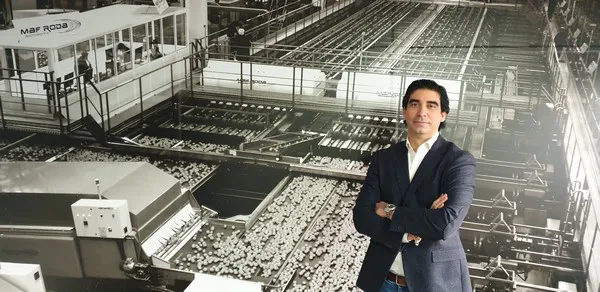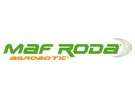Producing and marketing companies have been investing more in process automation and the implementation of new technologies for sorting and grading fruit since the advent of COVID-19, in the face of personnel restrictions. The Spanish fruit and vegetable sector is facing increasing pressure from third countries, which requires a constant commitment to automation and cost reduction in order to remain competitive. We live in the age of information, and artificial intelligence and big data have become essential to collect and manage it.
Jaime Mendizabal, commercial director of Maf Roda Ibérica, analyzed the current situation, needs and challenges of the sector when it comes to the implementation of automation technology in fruit sorting and grading.

Maf Roda is undoubtedly the strongest post-harvest machinery company both in Spain and in the Iberian Peninsula. Its headquarters in Alzira, Lleida and Fatima (Portugal), and its delegations in Murcia, Almería, Málaga and Seville ensure a close service in the main fruit and vegetable production areas of the Iberian Peninsula.
"This proximity to the production areas allows us to have a better knowledge of the products grown there and, consequently, to develop the technology that is best adapted to them and to the needs of the customers. This proximity service and knowledge about the products, as well as the ability to develop turnkey projects, has led to us gaining the trust of our customers, in many cases reaching market shares of more than 85%, depending on the type of product and the degree of automation required," says the company's commercial director.
The pandemic has accelerated the need for automation to reduce dependence on manual labor
The automation of processes and the implementation of new technologies for the sorting and grading of fruit is a trend that has been making headway for several years now among large, medium and small players in the sector, each within their possibilities. Jaime Mendizabal says that this process has actually been accelerated by the COVID-19 crisis.
"During this period, our customers have seen how restrictions in the area of human resources have reduced their productivity. They have been forced to open up to new solutions for the automation of processes that had previously relied on manual labor. The sector understands perfectly well that, today, process automation is not a minor issue, but a necessity to ensure the survival and growth of their companies."
All fruit and vegetables are being affected by this need for automation
One might think that the fruits with the highest added value would be the most susceptible to incorporate such technological advances, as it could be said that their value in the market justifies it. "It is indisputable that when consumers buy a relatively expensive fruit, they want to be sure that they are getting a top quality fruit; otherwise they will not repeat that purchase. Therefore, it is very important that, in these cases, our customers can guarantee this consistency at all times. This entails having facilities where the quality of the fruit that arrives from the field is preserved, and where the sorting is carried out in the most accurate and constant way possible. To achieve this, automatic grading technology, such as Globalscan 7 or Insight, has become essential.
However, regardless of the market value of the fruit or vegetable in question, Maf Roda's commercial director says that this technology not only makes it possible to guarantee the consistency of the product being sold, but also to improve a warehouse's overall performance and boost its productivity. "We live in an increasingly globalized world. Our customers are forced to compete with other countries with much lower labor costs. For this reason, reducing their production costs while ensuring a consistent quality product in the marketplace has become a must."
"This situation is resulting in automation processes being implemented across the board in the industry. Our automation solutions cover the entire process, from the time the fruit enters the warehouse until it hits the market; that is to say, from tipping to palletizing, final strapping and sorting. It is being implemented even in the internal transfer of goods with the incorporation of our AGV systems adapted to the sector."
Information age: "Artificial intelligence and big data have become indispensable"
"Honestly, I think we currently live in the information age. We pursue to obtain more and more data about the product we are sorting, not only to be able to supply the market with a product with increasingly better defined characteristics, but also to help in decision making in the field as regards both treatments and harvesting," says Jaime Mendizabal.
"The amount of information we want to obtain from the product is such that the incorporation of artificial intelligence and big data has become essential to collect and manage it. Today, automatic warehouse management, decision support and integrated traceability have become a necessity for our customers or, at least, very useful tools. Maf Roda showed its commitment to these lines of work some time ago by creating specific departments for their development. The technology is now being incorporated into warehouses across the board."
"The more automated a warehouse's sorting and production processes are, the more useful the integrated management tools become. These fully integrated systems allow us to improve the performance of the facilities, ensuring a better use of machinery and a wider range of options for fruit sorting. The turnkey solutions offered by Maf Roda, where all the machinery is fully integrated into a single system, greatly facilitate the day-to-day management of the warehouses and the optimization of performance in real time," says the company's sales manager.
To what extent will internal quality sorting and grading become the norm?
"Nobody likes buying a product only to find that it is rotten inside, dehydrated or completely tasteless. Consumers are becoming more and more demanding in this regard and such demands are likely to increase over the next few years. This consumer demand will make internal grading essential," says Jaime Mendizabal.
"For example, in pears and apples, the detection of internal rot through our IDD system has been common practice for many years. As for citrus, the detection of dehydration allows our customers to guarantee the quality of the fruit they deliver to the market at certain times of the season or after a frost, thereby preventing damage to a brand's reputation."
"As for Brix measurements, we have seen a notable increase in the demand for them with very diverse crops (tomatoes, citrus, blueberries, stone fruit, melons...) in the Iberian Peninsula," says Mendizabal.
"The installation of the Insight equipment has allowed our customers to guarantee the supply of products with a better taste and, therefore, to market them at a higher price, thereby making a greater profit. It has even allowed them to open new markets, such as Asia, where the Brix degree is of vital importance, as shown by the great demand for this equipment in that market. Many of Maf Roda's facilities in Asia have already installed it."
"Increasing the yield and productivity to reduce costs requires the modernization and automation of facilities"
According to the commercial director of Maf Roda, the biggest challenge for the Spanish fruit and vegetable sector in the coming years will undoubtedly be dealing with the strong competition and pressure from companies arriving from third countries.
"The production costs of these countries are much lower and that puts great pressure on prices in Spain. In a situation where prices are, therefore, practically imposed by the market, the sector has to focus on increasing yields and productivity both in the field and in the warehouse in order to reduce costs and maintain profits. This increase in yield and productivity will undoubtedly require investment in the modernization and automation of the facilities. In recent years, the Spanish fruit and vegetable sector has demonstrated its leadership, consolidation and strength at international level. It is an industry that has great professionals in Spain and a great capacity for resilience. I believe that, no matter how big the challenge, the sector will know how to adapt and rise to the occasion."
More than 60 patents throughout its history to maintain its position as a leader in automation
"For the entire Maf Roda Group team, our efforts and reinvestment in R&D should continue to focus on developing technology that delivers the most innovative solutions to tackle the challenges our customers face on a daily basis," says Mendizabal.
"Thanks to this continuous effort, we have managed to register more than 60 patents throughout our history and we currently have 7 R&D centers around the world. We all work in the search for the most innovative solutions in the 6 main areas: mechanical engineering, automation, electricity, electronics, traceability and robotics. By leading technological development and providing reliability and a solid service to our customers, as we do today, we will continue to strengthen our leadership in the industry," says Jaime Mendizabal.
 For more information:
For more information:
María Cabello
Roda Ibérica S.L.
Avda. de la LLIBERTAT Nº 53
46600 Alzira • SPAIN
T: +34 962403011
mcabello@mafroda.es
www.maf-roda.com
